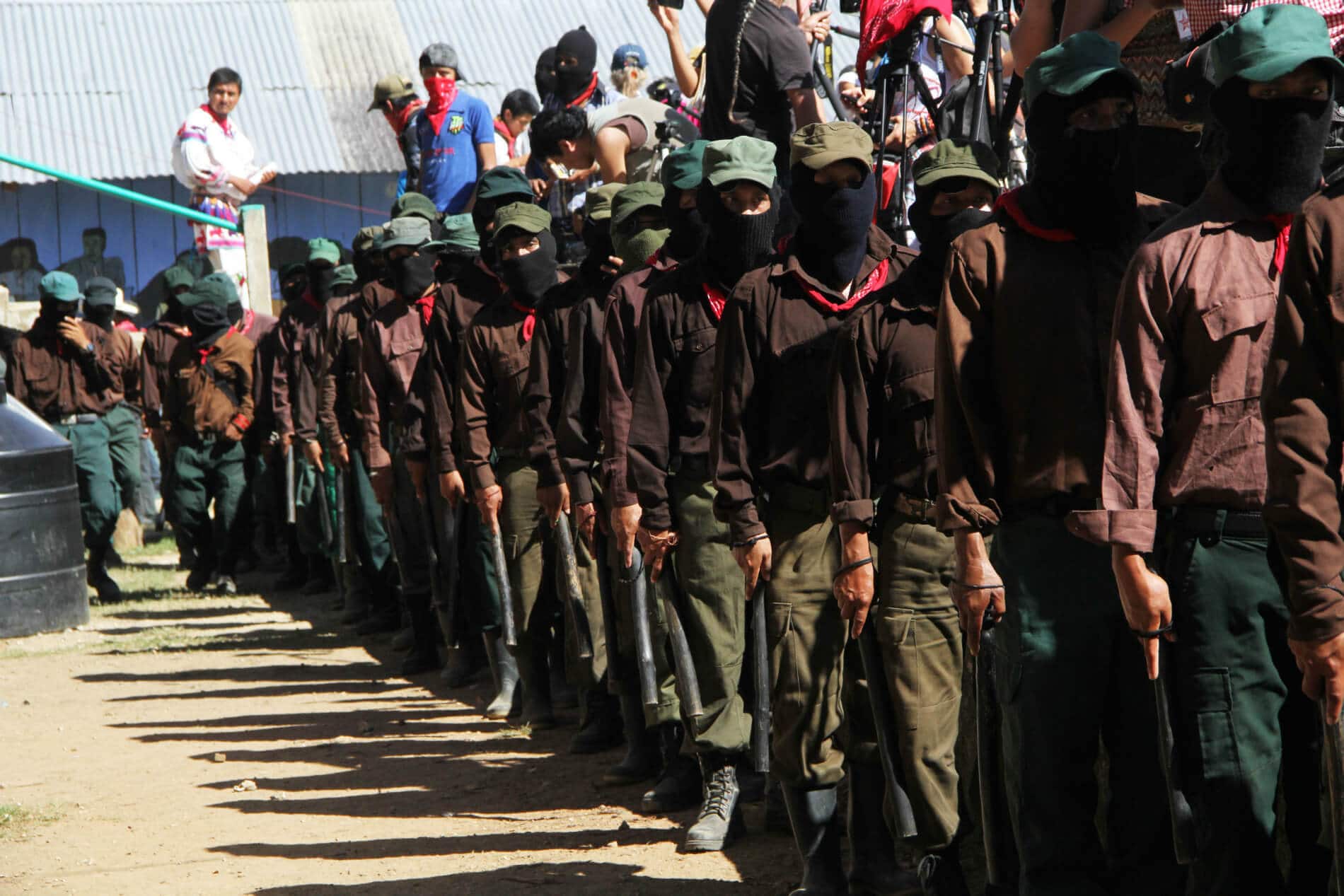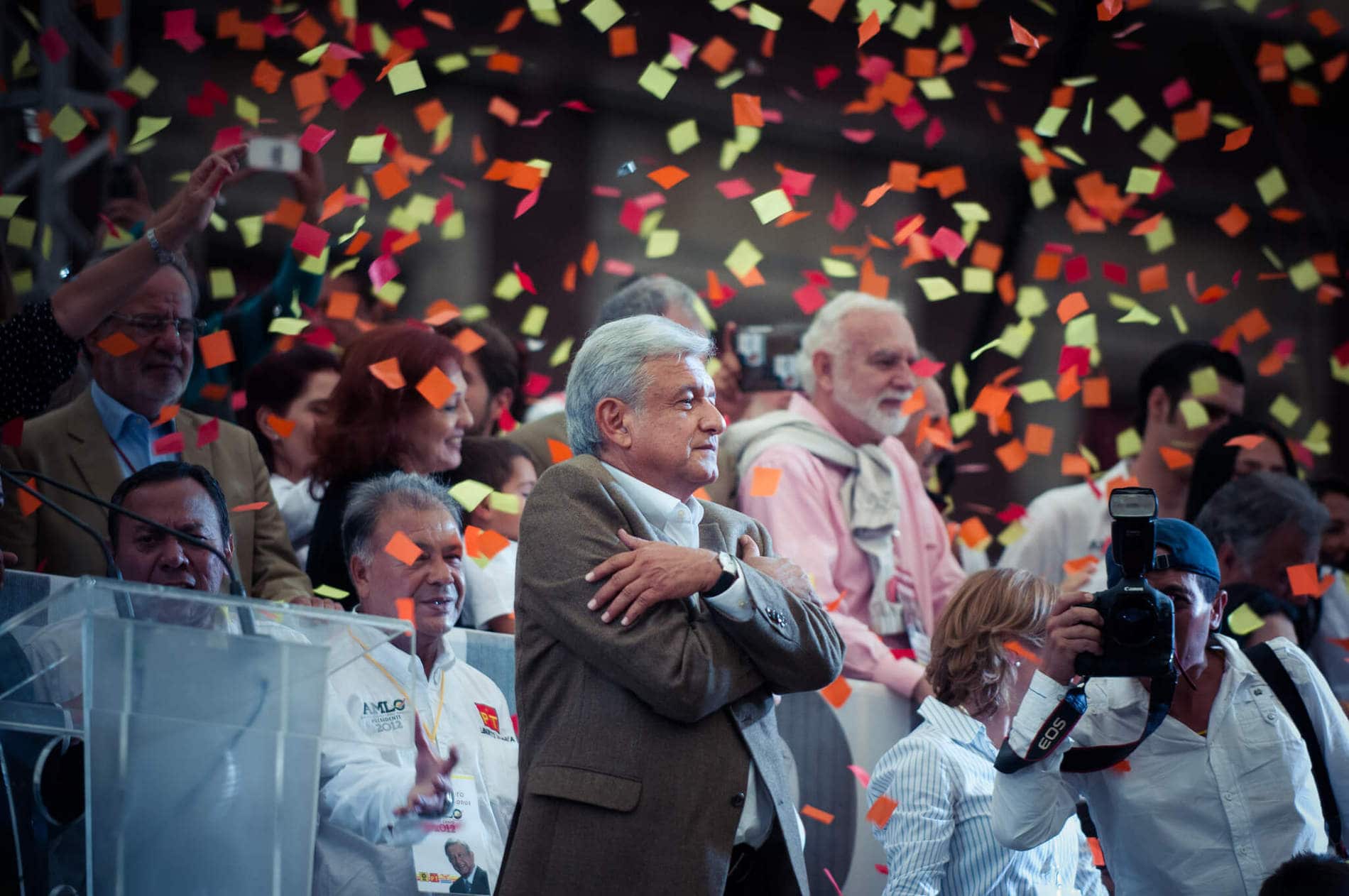
In response to Mexico’s election of Andrés Manuel Lopez Obrador (AMLO), the Zapatista Army for National Liberation (EZLN) has announced a new era in its now-25 year long “war against oblivion.”
The Autonomy Solidarity organization explains that the Zapatista are “At great risk” now that the Mexican state is under the leadership of AMLO, who is preparing “To unleash a series of massive development projects into the heart of Zapatista territory and throughout indigenous lands across the country.” The group goes on to explain that “Simultaneously, a malicious disinformation campaign is being used to delegitimize the EZLN and erase the work they have done during their 25-year struggle to inspire and support other struggles across Mexico and the world”.
The warning should not come as a total shock to those who have been paying attention. For some time, Indigenous groups have been expressing public resentment toward the mega-projects AMLO has supported or co-signed, criticizing the lack of prior and informed consent for projects which affected or traversed through their territories. Many have designated AMLO as “more of the same”.
AMLO, who ran as an anti-corruption candidate, has been widely viewed as a harbinger of much-needed progress in Mexico. He also garnered a lot of international attention during his campaign. Yet, he was never the real underdog in Mexico’s 2018 presidential race.
Maria de Jesus Patricio Martinez – often referred to as Marichuy – serves as the spokeswoman for the political branch of the EZLN (Zapatista National Liberation Army), and made history by running as the group’s presidential candidate in 2018 on a platform which sought to completely supplant the old guard. Martinez was also unique in her candidacy, being a Nahua Indigenous woman who promised to represent the chronically underrepresented impoverished peoples of Mexico; she made a strict pledge not to accept any government funding for her candidacy.
Surprisingly, Mexico’s campaign finance laws are stricter than some other countries – such as the United States – and, private contributions are ostensibly limited. However, to what degree political candidates comply with such regulations is highly suspect. Illegal campaign contributions are also considered a norm.
Ultimately, AMLO was chosen for the office of president. Mexico, it seemed, was looking for a familiar kind of progress.

President Andrés Manuel Lopez Obrador (AMLO). Photo: Eneas De Troya/flickr. (CC)
The reality is trickling in, now that AMLO must live up to his lofty campaign promises and the airtight, squeaky-clean, image he tries to project. Ironically, this seems to include a strategy, also optimized by leaders such as Justin Trudeau of Canada and Emmanuel Macron in France, of showing how he can ‘play nice’ even with Donald Trump. To this end, AMLO has received some attention for negotiating funding for Mexico and Central America from the United States under the Trump administration and other surprising behavior – causing The Washington Post to run this article, titled, ‘The Weirdly Great Relationship Between Trump and Mexico’s New Leftist President.’
Zapatista Subcomandante Insurgente Moisés, in this recent statement, refuses to even directly address AMLO and chooses to refer to him as a “trickster”, commenting, “It is not easy to stand up to the political parties, the bad governments, and the current trickster in chief. It is not easy to confront, for 25 years now, the thousands of soldiers, protectors of capitalism, who surround us. They are here even now, we’ve seen them all around here the last few days. It isn’t easy to confront the paramilitaries, or all of the small-time “leaders” who are bought off by politicians and political parties, especially the person and the political party in power today. But we aren’t afraid of them.”
In response to the Zapatista’s warning, the Autonomy Solidarity organization sent out a request for international solidarity in the form of a petition that is already backed by several notable figures including the highly respected Indigenous Rights defender, Winona LaDuke.
“We, intellectuals, academics, artists, activists and others in solidarity, as well as organizations, associations and collectives from across the world, express our solidarity with the Zapatista Army of National Liberation (EZLN) in this critical moment in its history, and condemn the ongoing campaign of disinformation, lies, and slander directed against the Zapatistas.
For us, and for many others around the world, the Zapatista struggle is a key referent for resistance, dignity, integrity and political creativity. 25 years ago, the cry of Ya Basta! was a historically transcendent event and one of the first categorical rejections of neoliberal globalization at a planetary scale, because it opened the way toward the critique and refusal of a model that at that time seemed unquestionable. It was and continues to be an expression of the legitimate struggle of indigenous peoples against the domination and contempt they have suffered for centuries and for their rights to autonomy. The self-government that the Zapatistas have put into practice with the Juntas de Buen Gobierno(Good Government Councils) in the 5 Caracoles is an example of radical democracy that inspires people and should be studied in social science departments around the world. For us, the Zapatista construction of autonomy represents the persistent and honest search for an alternative and emancipatory model crucial for a humanity facing the challenges of a world that is rapidly sinking into a deepening economic, social, political, ecological, and human crisis.
We therefore express our concern for the Zapatista communities and many other indigenous peoples in Mexico whose territories are being attacked by mining, tourism, agribusiness, and large infrastructure projects, etc., as recently denounced by the National Indigenous Congress (CNI) and the Indigenous Governing Council (CIG) of Mexico. At this very moment, the new Mexican administration is imposing a series of large-scale development projects — including the Trans-isthmus Corridor, a one million hectare commercial tree planting project, and the so-called “Mayan Train”– that Subcomandante Moisés, EZLN spokesperson, recently denounced as a humiliation and provocation that would have very serious impacts on the territories of the Mayan peoples of southeastern Mexican.
In addition to the devastating environmental effects and the massive tourist development the “Mayan Train” is designed to unleash, we are concerned about the pseudo-ritual asking permission from Mother Earth that was used to legitimize the race to begin laying its tracks, an act that the Zapatista spokesperson denounced as unacceptably mockery. We are outraged by ongoing preparation for further attacks on Zapatista territories and the denial of indigenous people’s rights, including their right to prior, free and informed consultation and consent, as established in ILO Convention 169 and the UN Declaration on Indigenous Peoples. This represents a serious violation of Mexico’s international commitments.
We echo the EZLN’s total rejection of these and other mega-projects that seriously threaten the autonomous territories and ways of life of indigenous peoples.
We denounce in advance any aggression against Zapatista communities, either directly by the Mexican State, or through groups or organizations of armed or unarmed “civilians.” We hold the Mexican government accountable for any confrontation that may arise through the attempted implementation of these mega-projects, which represent an already defunct, unsustainable and devastating model of “development” that is determined within the highest spheres of power in violation of the rights of original peoples.
We call on all good-hearted people to see through the current wave of disinformation about the Zapatistas and about the proposed mega-projects, and to be alert to the imminent risk of aggression against Zapatista communities and other indigenous peoples”.
Academic and activist, Ruth H. Matamoros Mercado, expressed some concern about how the statement being circulated about AMLO, abstracted from its context, was being used by others in a divisive manner – specifically, outside entities appropriating it to falsely imply that there was an inherent opposition to leftist governments from Indigenous Peoples “without really understanding what the Zapatista’s discourse is really about”.
Mercado credits the Zapatista with how, “they managed to break the usual left/right binary” in challenging an entrenched and corrupt political system.
IC contributor, Larry Montenegro Baena – an intellectual, activist, writer, and documentarian from the autonomous, traditionally Indigenous-led, region of La Moskitia (colonial Nicaragua) – has been traveling through Zapatista territories of late. Montenegro offered this perspective:
“…to understand the Zapatismo before the governments of Mexico, one must go to the heart of their resistance. Zapatista resistance is anti-systemic, therefore no State government, from the right or the left, will ever represent the real interests of indigenous peoples and their struggles in favor of the earth, their territories, their biodiversity, and collective and autonomous rights.
“A megaproject called the ‘Mayan Train’ is currently underway that was seen by AMLO as progress, and will be carried out from the state of Chiapas to the state of Quintana Roo to cover the entire cultural area of the Maya peoples, benefiting the interests of entrepreneurs who profit from cultural tourism for the usufruct of the Mexican State in terms of income, investments, concessions and taxes thanks to the millionaire business of tourism and its services. This project, for example, will not only lead to the dispossession of indigenous lands and the destruction of indigenous territories, but also threatens biodiversity. For that reason, the economic projects directed and approved by the governments of Mexico will always be a threat against the ways of life and biodiversity of the indigenous peoples because they are generated from the logic of capital and for usufruct of the national and international capitalists”.
.

Indigenous Peoples are putting their bodies on the line and it's our responsibility to make sure you know why. That takes time, expertise and resources - and we're up against a constant tide of misinformation and distorted coverage. By supporting IC you're empowering the kind of journalism we need, at the moment we need it most.